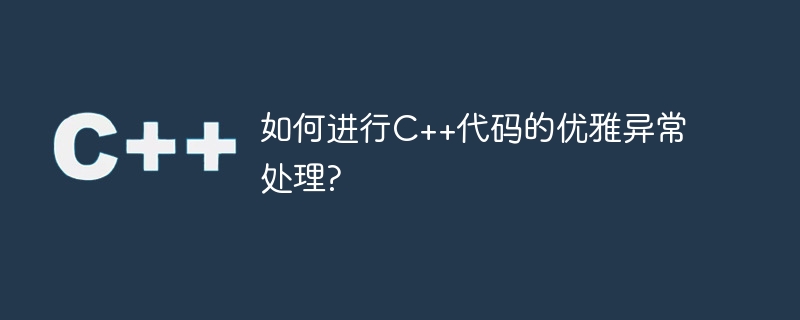

How to handle elegant exceptions in C code?
In the programming process, exception handling is an important aspect. Exception handling can help us handle unexpected situations during code execution and ensure the stability and reliability of the program. In C, the exception handling mechanism can effectively capture and handle errors, thereby helping us handle exceptions gracefully. This article will introduce some techniques and methods for graceful exception handling in C code.
First, use try-catch blocks to catch exceptions. In C, by using try-catch blocks, we can catch exceptions during program execution and handle them. The code in the try block is used to attempt to perform an operation that may throw an exception, while the code in the catch block is used to handle the caught exception. By rationally using try-catch blocks, we can handle different types of exceptions differently, thereby improving the fault tolerance of the program.
Second, use inheritance and polymorphism to define exception classes. In C, we can define custom exception classes through inheritance and polymorphism. By defining different types of exception classes, we can catch and handle different types of exceptions more accurately. For example, you can define a base class Exception and derive various exception classes, such as FileException, NetworkException, etc. By using inheritance and polymorphism, we can separate the exception handling code from the transaction logic, improving the readability and reusability of the code.
Third, use RAII (resource acquisition i.e. initialization) technology to manage resources. In C, RAII is a technique that acquires resources in an object's constructor and releases them in its destructor. By using RAII technology, we can avoid resource leaks and ensure the correct release of resources under abnormal circumstances. For example, dynamically allocated memory can be managed by using smart pointers, thereby avoiding the tedious step of manually freeing memory.
Fourth, try to avoid throwing exceptions in the constructor. In C, a constructor is a special function used to initialize the member variables of an object. Since the constructor is called during object creation, if the constructor throws an exception, the creation of the object will fail. Therefore, in order to avoid object creation failure, we should try to avoid throwing exceptions in the constructor. If you really need to perform some operations in the constructor that may throw exceptions, you can consider using the factory pattern or initialization function instead of the constructor.
Fifth, use exception specifications to specify the exceptions that a function may throw. In C, we can use exception specifications to specify the exceptions that a function may throw. By using the throw keyword at the end of a function declaration, we can explicitly specify the types of exceptions that a function may throw. Doing so can improve the readability of your code and help other developers understand the function's unusual behavior.
Graceful exception handling in C code is one of the skills that every programmer should master. By properly using try-catch blocks, inheritance and polymorphism, RAII techniques, and exception specifications, we can write code that is more robust, reliable, and easy to maintain. At the same time, we should also fully understand the exception handling mechanism in C, understand different types of exceptions, their usage and applicable scenarios. Only through continuous practice and learning can we become excellent C programmers and write high-quality code.
The above is the detailed content of How to handle graceful exceptions in C++ code?. For more information, please follow other related articles on the PHP Chinese website!




